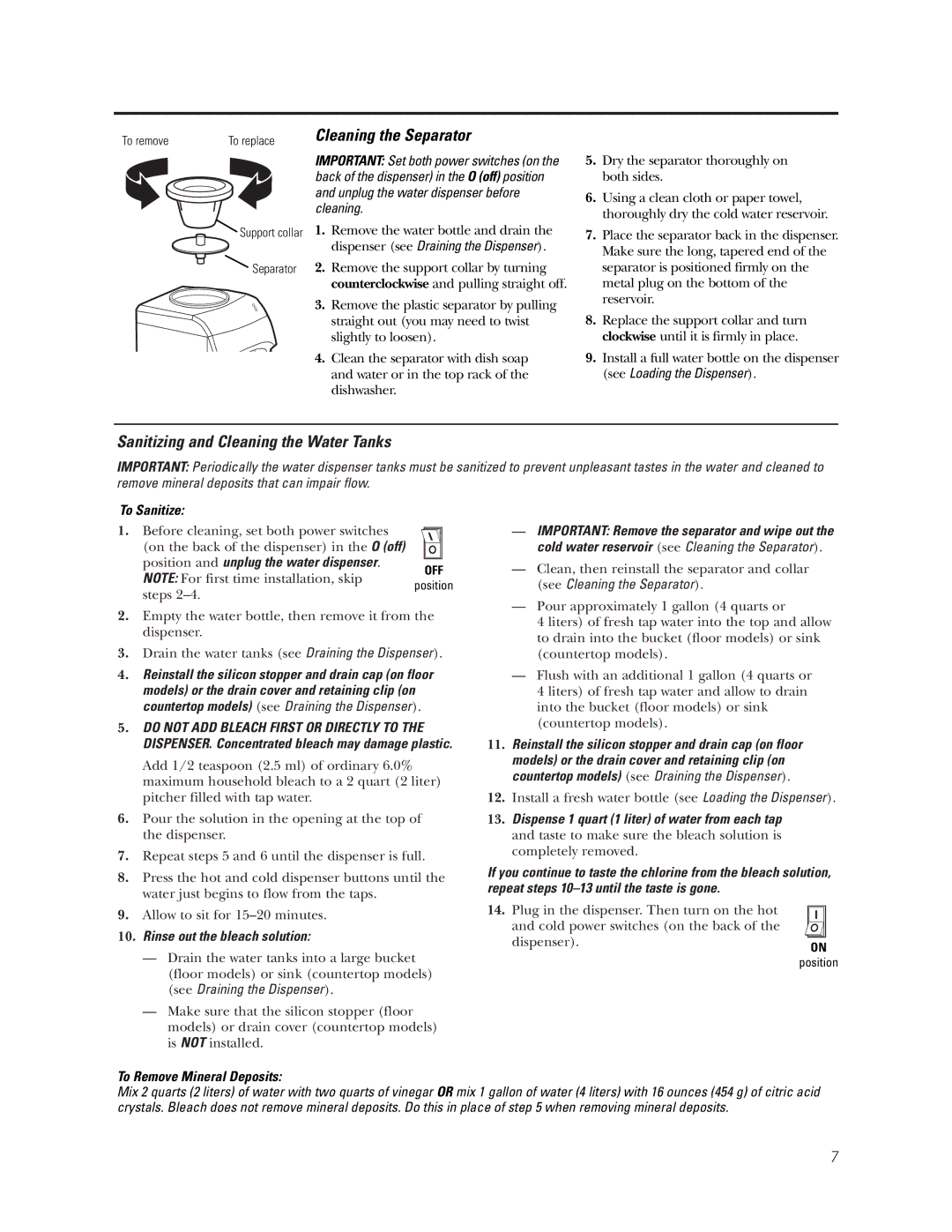
To remove | To replace | Cleaning the Separator | |
|
| IMPORTANT: Set both power switches (on the | |
|
| back of the dispenser) in the O (off) position | |
|
| and unplug the water dispenser before | |
|
| cleaning. | |
| Support collar | 1. | Remove the water bottle and drain the |
|
|
| dispenser (see Draining the Dispenser). |
| Separator | 2. | Remove the support collar by turning |
|
|
| counterclockwise and pulling straight off. |
|
| 3. | Remove the plastic separator by pulling |
|
|
| straight out (you may need to twist |
|
|
| slightly to loosen). |
4.Clean the separator with dish soap and water or in the top rack of the dishwasher.
5.Dry the separator thoroughly on both sides.
6.Using a clean cloth or paper towel, thoroughly dry the cold water reservoir.
7.Place the separator back in the dispenser. Make sure the long, tapered end of the separator is positioned firmly on the metal plug on the bottom of the reservoir.
8.Replace the support collar and turn clockwise until it is firmly in place.
9.Install a full water bottle on the dispenser (see Loading the Dispenser).
Sanitizing and Cleaning the Water Tanks
IMPORTANT: Periodically the water dispenser tanks must be sanitized to prevent unpleasant tastes in the water and cleaned to remove mineral deposits that can impair flow.
To Sanitize:
1. Before cleaning, set both power switches (on the back of the dispenser) in the O (off)
position and unplug the water dispenser.
— IMPORTANT: Remove the separator and wipe out the |
cold water reservoir (see Cleaning the Separator). |
NOTE: For first time installation, skip
OFF
— Clean, then reinstall the separator and collar |
steps
position
(see Cleaning the Separator). |
— Pour approximately 1 gallon (4 quarts or |
2.Empty the water bottle, then remove it from the dispenser.
3.Drain the water tanks (see Draining the Dispenser).
4.Reinstall the silicon stopper and drain cap (on floor models) or the drain cover and retaining clip (on countertop models) (see Draining the Dispenser).
5.DO NOT ADD BLEACH FIRST OR DIRECTLY TO THE DISPENSER. Concentrated bleach may damage plastic.
Add 1/2 teaspoon (2.5 ml) of ordinary 6.0% maximum household bleach to a 2 quart (2 liter) pitcher filled with tap water.
6.Pour the solution in the opening at the top of the dispenser.
7.Repeat steps 5 and 6 until the dispenser is full.
8.Press the hot and cold dispenser buttons until the water just begins to flow from the taps.
9.Allow to sit for
10.Rinse out the bleach solution:
—Drain the water tanks into a large bucket (floor models) or sink (countertop models) (see Draining the Dispenser).
—Make sure that the silicon stopper (floor models) or drain cover (countertop models) is NOT installed.
| 4 liters) of fresh tap water into the top and allow |
| to drain into the bucket (floor models) or sink |
| (countertop models). |
| — Flush with an additional 1 gallon (4 quarts or |
| 4 liters) of fresh tap water and allow to drain |
| into the bucket (floor models) or sink |
| (countertop models). |
11. | Reinstall the silicon stopper and drain cap (on floor |
| models) or the drain cover and retaining clip (on |
| countertop models) (see Draining the Dispenser). |
12. | Install a fresh water bottle (see Loading the Dispenser). |
13. | Dispense 1 quart (1 liter) of water from each tap |
| and taste to make sure the bleach solution is |
| completely removed. |
If you continue to taste the chlorine from the bleach solution, repeat steps
14. Plug in the dispenser. Then turn on the hot |
|
and cold power switches (on the back of the |
|
dispenser). | ON |
| |
| position |
To Remove Mineral Deposits:
Mix 2 quarts (2 liters) of water with two quarts of vinegar OR mix 1 gallon of water (4 liters) with 16 ounces (454 g) of citric acid crystals. Bleach does not remove mineral deposits. Do this in place of step 5 when removing mineral deposits.
7
